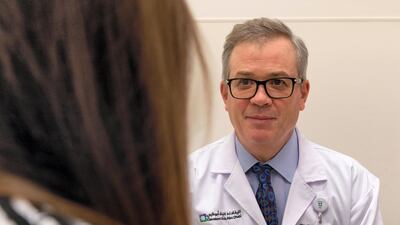Demand for cancer surgeries is expected to increase by more than 50 per cent by 2040 due to unhealthy lifestyles and longer lives.
With new early detection blood tests and the latest in precision surgery and treatments, doctors will mark World Cancer Day on Thursday with a sense of optimism.
Research by the University of New South Wales showed that the number of cancer operations around the world could surge from nine million to 13.8 million in the next 20 years.
The greatest increase will be in 33 low-income nations, according to the study published by The Lancet.
It found the surgical workforce in high-income countries would need to increase four-fold, while 5.5 times the current number of anaesthetists would be required.
“We will face a growing demand for cancer surgery so it is important we build teams to cope with this,” said Dr Stephen Grobmyer, chairman of the oncology institute at Cleveland Clinic Abu Dhabi.
“With an ageing population, we expect more cancer cases in the future. In the UAE we are well positioned, with a lot of great things happening with regard to cancer care to give hope to patients.”
A new cancer treatment centre at the hospital will be the latest addition to high-class cancer care in the UAE and follows the opening of Burjeel Medical City in 2019.
The specialist cancer treatment centre was built in Mohamed bin Zayed City and can care for 400 patients. It became a specialist Covid-19 centre at the height of the pandemic.
Improving cancer care infrastructure is changing the way patients are treated,” said Dr Grobmyer.
“Historically cancer treatment has been the main reason people would leave the country for care,” he said.
“That is changing as we can offer the most modern cancer care here.
“All FDA-approved medication in the US are either offered here or obtainable, so patients generally do not need to leave the country any more.”
Last year, the UAE reported 4,807 new cancer cases and 1,896 deaths. There were 14,816 prevalent cases over a five-year period, according to the World Health Organisation.

Breast cancer was the most common type of the disease among women, while men suffered most from colorectal cancer. Leukaemia and cancer of the prostate and thyroid completed the top five most common forms of the disease.
“The UAE is a developed country that has committed to investing economic resources in improving cancer care across the country,” said Dr Charu Thadani, director of health services at insurance company Aetna International.
“There has been significant focus and investment from the government to improve healthcare facilities, scope of services and expertise available for UAE nationals and residents dealing with cancer.”
In 2018, Dubai Health Authority started the Basmah initiative, under which all plans in the Dubai Mandatory Health Insurance Scheme covered screening, as well as treatment of breast, colorectal and cervical cancers.
Research could also change the way cancer is diagnosed through blood screening.
Meanwhile, 3D mammograms allow medics to see right through dense breast tissue to spot abnormalities that are sometimes hidden.
In recent years, immunotherapy has been used as an alternative to aggressive chemotherapy and radiation. Immunotherapy is more targeted form of treatment that uses the body’s immune system to fight the cancer.
“Different types of immunotherapy work in different ways,” said Dr Arun Karanwal, an oncologist at Prime Hospital in Garhoud, Dubai.
“Some stimulate the immune system so it works better against cancer. Others remove barriers that stop the immune system attacking the cancer.
“These are now part of treatment options for many cancers, particularly in advanced stages.”
Visiting a doctor early to detect cancer can lead to a better chance of survival.
Widespread national screening programmes have come down hard on cancer in recent years. Abu Dhabi health authorities began screening programmes for colorectal, breast and cervical cancers in 2008, while the Dubai Health Authority introduced breast, cervical and colon cancer screening in 2014.
But doctors said screening had been sidelined during the pandemic, with fewer people prepared to visit hospitals for tests because of fear infection.
“Covid will not wait for cancer – cancer waits for no one,” said Dr Humaid Al Shamsi, UAE director of VPS oncology services and president of the Emirates Oncology Society.
”We want to increase awareness on early detection and screening. This has been one of our biggest challenges.”
Doctors said prevention would always prevail over technology. Smoking, alcohol, a poor diet and a sedentary lifestyle are factors that can increase the risk of cancer.
Medics estimated that about 60 per cent of cancer patients delayed hospital visits during the pandemic.
"We are seeing more patients with advanced cancer because of Covid-19," said Dr Al Shamsi.
“Patients delay their hospital visits and don’t come to their screening appointments, which is a problem.”

